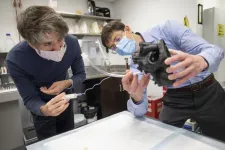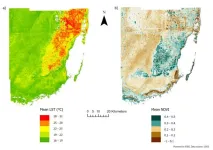(Press-News.org) Mount Sinai Health System today announced that Mount Sinai BioDesign, the medical technology incubator of the Health System, has expanded its reach to become a key, effective partner for the broader MedTech community.
Through synergistic partnerships between clinicians, technologists, and industry partners, Mount Sinai BioDesign is able to offer an array of services, including expert clinical and engineering feedback, preclinical trial development and execution, data gathering and analysis, and pivotal clinical study management. Mount Sinai BioDesign has already established several mature partnerships that have successfully designed and launched clinical trials, conducted user-feedback studies, assisted in submissions to the U.S. Food and Drug Administration, and facilitated the development of novel algorithms. Mount Sinai BioDesign is now actively seeking to expand their collaboration with a growing number of industry partners.
“In recent years, Mount Sini BioDesign has evolved from focusing solely on internal projects to becoming a pivotal resource for industry partners and startups,” said Benjamin Rapoport, MD, PhD, Assistant Professor of Neurosurgery at Icahn Mount Sinai and Scientific Director of Mount Sinai BioDesign, “This strategic shift has enabled our team to assist external entities in navigating the complexities of health system integrations and accelerating the development and implementation of new technologies. By partnering with major industry leaders, we’ve been able to extend our impact into broader specialties at various stages of the translational pipeline, while enhancing their ability to effectively develop the next generation of tools to assist clinicians and improve patient treatment and care.”
Through its expansion, Mount Sinai BioDesign is engaging with startup companies via Elementa Labs, Mount Sinai’s virtual accelerator program that enables startups to explore ways to strategically align their efforts with Mount Sinai. Mount Sinai BioDesign is a key program partner in identifying and working with MedTech companies, helping to grow post-program opportunities that benefit both the startups and Mount Sinai’s broader initiatives
Established in 2017 under the leadership of Joshua B. Bederson, MD, System Chair of the Department of Neurosurgery, Mount Sinai BioDesign merges clinical and engineering expertise to catalyze the translation of innovative ideas into tangible solutions that improve patient outcomes. Initially focused on addressing internal clinical challenges, it has since become the cornerstone of medical innovation within the Mount Sinai Health System and developed a robust track record in project management and commercialization. The multidisciplinary team of clinicians, designers, engineers, and entrepreneurs has transformed complex medical challenges into opportunities for technological advancement, advancing the culture of innovation that is paramount at Mount Sinai.
“Mount Sinai BioDesign fosters an environment where novel concepts are transformed into patents, prototypes, and ultimately, commercially viable products,” said Dr. Bederson, Executive Director of Mount Sinai BioDesign and the Leonard I. Malis / Corinne and Joseph Graber Professor of Neurosurgery at Icahn Mount Sinai. “Each year, we engage with dozens of active clinicians and surgeons to guide them through a novel phase-gated system of product development and startup launch and we now also have a proven track record of successful projects with medical technology industry collaborators of all sizes. We are eager to expand our reach even further to offer unprecedented opportunities for startups and established industry leaders to refine their products and bring their innovations to the many patients we serve.”
About the Mount Sinai Health System
Mount Sinai Health System is one of the largest academic medical systems in the New York metro area, with 48,000 employees working across eight hospitals, more than 400 outpatient practices, more than 600 research and clinical labs, a school of nursing, and a leading school of medicine and graduate education. Mount Sinai advances health for all people, everywhere, by taking on the most complex health care challenges of our time—discovering and applying new scientific learning and knowledge; developing safer, more effective treatments; educating the next generation of medical leaders and innovators; and supporting local communities by delivering high-quality care to all who need it.
Through the integration of its hospitals, labs, and schools, Mount Sinai offers comprehensive health care solutions from birth through geriatrics, leveraging innovative approaches such as artificial intelligence and informatics while keeping patients’ medical and emotional needs at the center of all treatment. The Health System includes approximately 9,000 primary and specialty care physicians and 11 free-standing joint-venture centers throughout the five boroughs of New York City, Westchester, Long Island, and Florida. Hospitals within the System are consistently ranked by Newsweek’s® “The World’s Best Smart Hospitals, Best in State Hospitals, World Best Hospitals and Best Specialty Hospitals” and by U.S. News & World Report's® “Best Hospitals” and “Best Children’s Hospitals.” The Mount Sinai Hospital is on the U.S. News & World Report® “Best Hospitals” Honor Roll for 2024-2025. For more information, visit https://www.mountsinai.org or find Mount Sinai on Facebook, Twitter and YouTube.
###
END
Study Reveals Limits of Using Land Surface Temperature to Explain Heat Hazards in Miami-Dade County
The findings underscore the importance of further research to enhance our understanding of urban heat dynamics in subtropical and tropical regions, ensuring that heat mitigation efforts are informed by the most accurate data available.
A recent study published in the journal PLOS Climate on October 2, 2024, examines the effectiveness of using land surface temperatures (LSTs) as proxies for ...
First in-depth forecasts of future worldwide health impacts of smoking reveal potential effects of eliminating smoking on life expectancy and premature deaths by 2050.
Based on current trends, global smoking rates could continue to decrease to 21.1% in males and 4.18% in females by 2050.
Analysis indicates accelerating actions towards the elimination of smoking globally would increase life expectancy and prevent millions of premature deaths, resulting in 876 million fewer years of life lost (YLLs).
Reducing smoking rates to 5% by 2050 would increase life expectancy by one year among males and 0.2 years among females ...
Analysis of the impact on lung cancer deaths of banning tobacco sales in people born between 2006 and 2010 indicates 1.2 million deaths could be avoided.
The findings suggest the creation of a tobacco-free generation could prevent almost half (45.8%) of future lung cancer deaths in men, and around one-third (30.9%) in women, in this birth cohort.
Nearly two-thirds (65.1%) of the deaths averted would be in low- and middle-income countries (LMICs). Close to two-thirds (61.1%) of all lung cancer deaths in high-income countries would be avoided.
Creating a generation of people who never smoke could prevent 1.2 million deaths from lung cancer globally, according ...
The number of adults vaping in England who have never regularly smoked has increased sharply since 2021, when disposable e-cigarettes first became popular, according to a new study by UCL researchers.
The study, published in Lancet Public Health and funded by Cancer Research UK, estimated that, as of April 2024, about one million adults who had never regularly smoked now vaped in England, a sevenfold increase since 2021, with most of them vaping daily and over a sustained period.
This increase was largely driven by young adults, ...
New research has found methane emissions from slurry stores on dairy farms may be up to five times greater than official statistics suggest - and highlights the huge potential for turning them into a renewable energy source.
The study shows that if captured and turned into biogas, emitted methane could be worth more than £400m a year to the dairy sector in saved fuel costs, or around £52,500 for an average-sized dairy farm.
Capture technology already exists, and if rolled out across the EU dairy herd, the conversion of methane to biofuel could reduce emissions equivalent to an estimated 5.8% of the ...
UNDER STRICT EMBARGO UNTIL 00:01 AM (UK TIME) ON THURSDAY 3RD OCTOBER 2024
A rare collection of 300-year-old petitions gives voice to the forgotten women who cared for England’s most vulnerable children while battling their local authorities.
‘Confirm the said yearly annuity or otherwise the child is very like to be famished & starved’
– Ellen Fell (1665)
'Taking pity of them for fear they should be starved to death for want of food [I] did table & receive the said three Children' - Anne Beesley (1671)
Today, the UK faces a major retention ...
Polar sea ice is ever-changing. It shrinks, expands, moves, breaks apart, reforms in response to changing seasons, and rapid climate change. It is far from a homogenous layer of frozen water on the ocean’s surface, but rather a dynamic mix of water and ice, as well as minute pockets of air and brine encased in the ice.
New research led by University of Utah mathematicians and climate scientists is generating fresh models for understanding two critical processes in the sea ice system that have profound influences on global climate: the flux of heat through sea ice, thermally linking the ocean and atmosphere, and the dynamics of the ...
MINNEAPOLIS/ST. PAUL (10/2/2024) — The University of Minnesota Medical School recently received a five-year, $3.2 million R01 grant from the National Institute of Arthritis and Musculoskeletal and Skin Diseases for a project that will study the epigenetic factors of low back pain. Low back pain affects 619 million people globally and is the single leading cause of disability worldwide, according to the World Health Organization. This chronic pain impacts people of all ages and can affect quality of life and mental well-being.
Epigenetics refers to biological processes that affect how genes work without altering the DNA itself. These changes can ...
SAN ANTONIO, Oct. 2, 2024 – The Caring for the Caregiver Program (C4CP) of the School of Nursing at The University of Texas Health Science Center at San Antonio (UT Health San Antonio) has earned a national award for its comprehensive education and support for families living with dementia.
The 5TH Annual Maude’s Awards were announced in Seattle, rewarding innovations that enrich the quality of life for persons living with Alzheimer’s disease and related dementias, as well as their care partners. The award was created in 2019 by Richard Ferry, co-founder of management consulting firm Korn Ferry International, ...
If you started watching a movie from the middle without knowing its plot, you’d likely be better at inferring what had happened earlier than predicting what will happen next, according to a new Dartmouth-led study published in Nature Communications.
Prior research has found that humans are usually equally good at guessing about the unknown past and future. However, those studies have relied on very simple sequences of numbers, images, or shapes, rather than on more realistic scenarios.
"Events in real life have complex associations relating to time that haven't typically been captured in past work, so we wanted to explore how people make inferences ...




